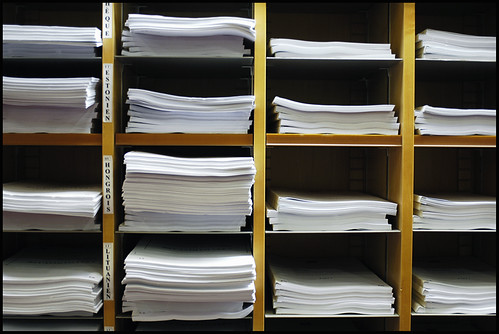European Parliament (flickr) / Creative Commons BY-NC-ND 2.0
Sitting in Wednesday’s EU Parliament hearing on the topic of access to EU documents and freedom of information felt a little like policy speed dating.
15 external speakers and more short interventions from Members of the European Parliament (MEPs) – although embarrisingly few MEPs were present in the audience – were put on the agenda of the 3 1/2 hours meeting that was chaired by Heidi Hautala, Michael Cashman and Anneli Jäätteenmäki.
The arguments and perspectives exchanged were “the usual suspects” for those who have followed the debate in the past, highlighting the need for reform of the current access to EU documents regime while asking for more pro-active implementation of the current law (i.e. regulations 1049/2001 & 1367/2006). The discussion touched also on the reform process initiated by the EU Commission in 2008.
If you want, you can watch the recording of the hearing online to see all the interventions. There’s also an EU Parliament press release following the event.
Some points I found particularly noteworthy during the meeting:
- Michael Cashman – who is in charge of the EU access to documents reform in the Parliament – announced that the Parliament’s leadership actually tried to prevent this hearing short before. He is planning to complain about that.
- Helen Darbishire from Access Info reported about the recent landmark case on access to EU documents they won against the EU Council. The fact that this lead to reactions from all around the world underlined how important it is for the EU to set a positive example instead of lagging behind.
- Nikiforos Diamandouros, the EU Ombudsman, told us that he had been proposing that the current access to documents regulation would technically amended, bringing its provisions in line with the Lisbon Treaty without prejudice to more extensive reforms. This technical amendment has been put forward by the EU Commission recently.
- Cesare Onestini from the European External Action Service (aka the EU’s diplomatic service) informed that they have just drafted their internal rules on how to handle access to documents requests. The draft was now in the hands of Catherine Ashton, the EU’s “foreign minister”, for approval.
- Peter Hustinx, the EU data protection supervisor, reminded that he has
recently issued a guidance paper on how to balance the protection of
personal data with the need for institutional transparency, not least
after the EU Court ruling “Bavarian Lager v. Commission” that was
mentioned by several speakers during the hearing. - Sakari Vuorensola from the EU borders agency “FRONTEX” counted only 10 [sic!] requests for access to documents per year for his agency. He also told that they now produce public versions of certain internal reports to ease access to public information contained in these reports.
- Tony Buyan of Statewatch.org presented his analysis of the latest minimal reform proposal where he argues that the Commission’s proposal ignores crucial transparency provisions introduced through the Lisbon Treaty.
- And last but not least it was interesting to hear that Hubert Szlaszewski has assumed his responsibilities as Director for Better Regulation and Administrative Policies in the EU Commission two weeks ago, now being in charge of access to documents in the Commission.
It’s difficult to judge in how far this hearing has contributed to the legal and practical reform of access to EU documents. I’d say that it was a good summary of where we stand right now without giving clear guidance on how to move on.
But the longer I watch the legal reform process, the more doubts I have that EU Commission, Parliament and the member states in the Council will come to grips and finally agree on a meaningful improved EU access to documents regulation. I hope I am wrong, but I’m not alone with this feeling from what I hear.
In this sense the hearing was a reminder that we as civil society have to keep up the pressure on the EU institutions and EU member states, through advocacy, expertise and court cases while also trying to find practical solutions that ease the access to EU documents for citizens and NGOs, whether or not the current legal basis will change significantly or not.
Ronny Patz, Transparency International Liaison Office to the EU
















 Connect with us on Facebook
Connect with us on Facebook Follow us on Twitter
Follow us on Twitter